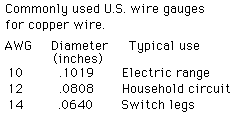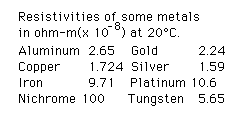Resistivity Calculation – The electrical resistance of a wire would be expected to be greater for a longer wire, less for a wire of larger cross sectional area, and would be expected to depend upon the material out of which the wire is made (resistivity). Experimentally, the dependence upon these properties is a straightforward one for a wide range of conditions, and the resistance of a wire can be expressed as

Resistance = resistivity x length/area
|
Standard wire gauges |
Table of resistivity's |
The factor in the resistance which takes into account the nature of the material is the resistivity. Although it is temperature dependent, it can be used at a given temperature to calculate the resistance of a wire of given geometry.
Whether or not a material follows Ohm's law, its resistance can be described in terms of its bulk resistivity. The resistivity, and thus the resistance, is temperature dependent. Above sizable ranges of temperature, this temperature dependence can be predicted from a temperature coefficient of resistance.


